| BizBridges |  |
Home / BizBridges /
|
|
|
 |
| Management/ Strategy |
| Corporate Leadership Lessons from World Cup Cricket 2011 |
| Author : | thedesk |
| Institute : | |
| Posting Date : | 07/04/11 |



|
|
|
| Total 25 vote(s). |  | |
|
|
|
|
|
The ICC Cricket World Cup 2011 threw up some exciting leadership lessons for everyone! Whether it was the cool MSD or the stoic Andrew Strauss or the energetic Afridi or the dour coach Kirsten, it had many curious examples that could help us draw valuable lessons at the workplace. 6bridges put together this article for you - drawing mostly from the world cup and recalling some old lessons too, in the bargain. Its these examples that make such lessons that much more interesting and realistic. Read on...
|
|
|
6bridges continues with its series of unearthing lessons from important events like world cups or from organizations like the Indian army. This time we opened the leadership book of the 2011 cricket world cup and found quite a few important lessons that the corporate world could find helpful.
Most leadership lessons may begin to sound familiar after sometime. However it’s the real life examples from an event that everyone watched and can relate to, which make these lessons memorable. Here are the lessons:
Effective teamwork is the cornerstone of every organization

Picture Lesson: Let’s do the drill together. Shh…crowd ko pata nahi chalna chahiye hum so rahey hain!
Let’s start the lessons this way. Did you notice the presence of Ryan Ten Doeschate of the Netherlands and Kevin O’Brien of Ireland in the two minnow teams that played this world cup? Did you notice that despite the best efforts of these two and some other cricketers in sides like West Indies who had Kemar Roach and Australia who had Brett Lee, there was a palpable lack of thrust from these two sides who had been world beaters earlier, especially the Aussies who have been world beaters not long ago.
This was because of the absence of an overall team effort from these sides. If Lee was the main weapon that Australia thrust upon its opponents and Roach likewise for West Indies, there weren’t too many people to support them. In batting, while the West Indies had none, Australia only had Ricky Ponting stand up to the plate in the last match.
An organization of brilliant individuals can sometimes perform below par because there is no binding force. A leader or manager has to look at the intersection points in a team - as to what binds them. He has to grasp the chemistry in a team and ensure there is enough communication in the team to help it bind. If there is little forward or positive communication, the impact will be minimal. Sometimes, having good individuals and not having an understanding about each one’s role can result in scattered teamwork.
Talented, wayward and undisciplined individuals can never make a good team

(Courtesy: Amul Butter advertisement)
Picture Lesson: Agli baar MSD se ‘bada pow’ milega!
Pakistan, over the years, have been one of the best examples of how a bunch of talented individuals have continued to disappoint. Being unpredictable as a team is the result of poor leadership in cricket administration and the way the game is run in Pakistan. Also, Pakistan’s cricket has gone off the rails in recent years for want of good leadership - both on and off the field. If it’s said that this time Pakistan has done well, let it also be said that because of poor leadership, Pakistan lost one of the best bowling attacks in the world. The match fixing cases of Amer and Asif are examples of dismal leadership off the field that led to unsavoury elements taking charge.
In contrast, bothIndia and Sri Lanka had captains who could motivate their teams to adopt better discipline and consistency. There were wayward individuals too like Sreesanth who could be unpredictable at times. In the final against Sri Lanka, Sreesanth was flanked by Harbhajan and Sachin Tendulkar while he was bowling. MS Dhoni, the Indian captain had put those two in position to guide the unpredictable bowler so that the waywardness of Sreesanth is negated and his strengths are exploited more. Though the move didn’t work (even Dhoni seemed to give up after a few overs of the Kerala speedster) the intent was clearly seen in the actions. Shoaib Akhtar, a perennial troublemaker for Pakistan, was kept away by their captain after his show of indiscipline in the early stages. That gave an opportunity for Pakistan to unearth new talent in the form of Wahab Riaz who bowled so well against India.
There would be people in any set-up who seem to forever get under the skin of others. If a manager is unable to identify such characters, it might harm the environment in an organization in the long run. A manager must read the signals and ensure that individuals who are troublesome are not allowed to hamper team efforts or the core functioning in the organization. Also, giving quieter performers a platform to excel will give the right signals that a good performance is recognized. Being firm with wayward individuals allows consistent and committed performers to be motivated as they feel more wanted and part of the organization.
Reward good performances
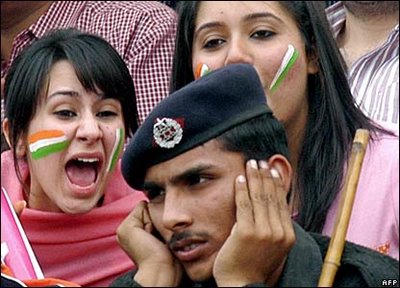
Picture Lesson: Compliments, when made, have to be loud and clear!
The Indian batting had been collapsing once too often in the group stages of the tournament. So, once the Indian team got into the quarter finals there was a furious debate about getting more quality batsmen in the side to shore up the middle order. Suresh Raina had been included in one match before the quarters but had failed. However he fielded so well that it lifted the general fielding standards of the team too. Being a genuinely good batsman, the captain kept his faith on his abilities and did not judge him after a one-off failure.
Raina reposed the faith of his captain and played match winning knocks in both the quarter finals and the semi finals - and against teams like Australia and Pakistan that had powerful bowling attacks. He also fielded magnificently in these games and saved a number of crucial runs for the team. He shone as an all-round influence and sealed his place in the team. Ashish Nehra was brought back for a crucial semi final, even after being hammered in the last over against South Africa, which resulted in India losing its only match of the tournament. Dhoni was pilloried by everyone, but the captain put faith in the left armer. The bowler delivered with a tight performance in a tense game against Pakistan.
In an organization, rewarding a good performance helps push up the level of efforts of everyone. A reward works both as a performance incentive and also as a tool of job satisfaction. If a colleague has done well in his role or task, however small or challenging it might have been, it needs to be appreciated. The more transparent and just the reward systems are, the better the effect is. A just system causes lesser heartburn and induces a culture of fairplay. There is a sense of equality that a leader must nurture in an organization. Rewarding a professional colleague can be either tangible - through monetary recognition or through intangibles - by introducing a best employee award system. Rewarding an employee must be done in time, for rewarding someone for good work done in the ‘ancient past’ may not have the same effect!
When the going gets tough, the tough get going - Lead from the front
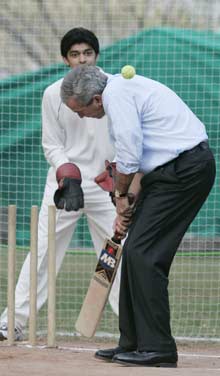
Picture Lesson: While leading from the front you might encounter some awkward moments, but play on the front foot.
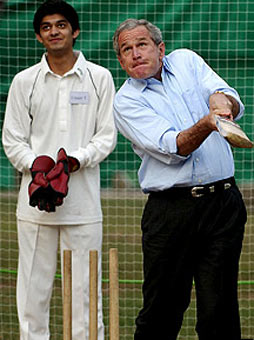
Picture Lesson: Even if you’re not the most talented guy around, you can still show them how to hit your opponents for a six!
This is an old cliché, but people always love to hear examples that are inspiring. Interestingly, most captains led from the front in this world cup. Andrew Strauss played a cracker of a knock when pitched against India. So did Ricky Ponting after being in poor form throughout the tournament. The same goes for MSD who, after having a rather quiet tournament, stood up to be counted in the final when it mattered most. Having lost Virat Kohli and with a large score to chase, an out of form MSD stepped in ahead of Yuvraj. That was one of the most defining leadership statements made in this world cup. He took up the gauntlet and took India home and dry, making it look easy and like a captain - steered the ship ashore and past a gathering storm.
In any organization, it’s the manager or the leader who has to show the way. An example is the best possible way to do this. An example is best understood when a manager takes up a real life situation to drive home a point about how he wants the job to be done. He may instruct his colleagues on the targets, approach and other aspects, but if he can show it in the best possible manner, he is able to make his team understand the way to go about it. Also, a skipper in a team who leads from the front and leads his team out of a crisis himself begins to enjoy the confidence of the team.
Create the hunger to perform

Picture Lesson: Beware: A hungry man can either chew brains or balls!
The West Indies team had a bunch of individuals who did not seem to be motivated enough. The hunger to win wasn’t enough. The same was the case with the English team which saw their players leaving the world cup one by one. In case of these teams there was a clear case of leadership not being inspiring enough and the players not determined enough. While Darren Sammy could not push Gayle enough, Andrew Strauss’ unit always seemed to look like tourists who were either coming or going.
In any team in an organization, there needs to be a hunger that passes through the intent and actions of the team members. If there is little hunger in a team, then it is very difficult to get the individuals to perform. In a team, this hunger can be developed through a healthy competition within a team, or by encouraging them to perform. A leader must identify the existing degree of hunger in the organization - is it the challenge of work that motivates people or is it the banality of it that is shaping a team’s lack of hunger. A manager must keep the work desire alive in his team. To use the analogy of a horse, you can hire a corporate executive at work but you can’t make him excel in it, unless you sell him the excitement and importance of his job!
Excellence must be a pursuit and not mere lip-service
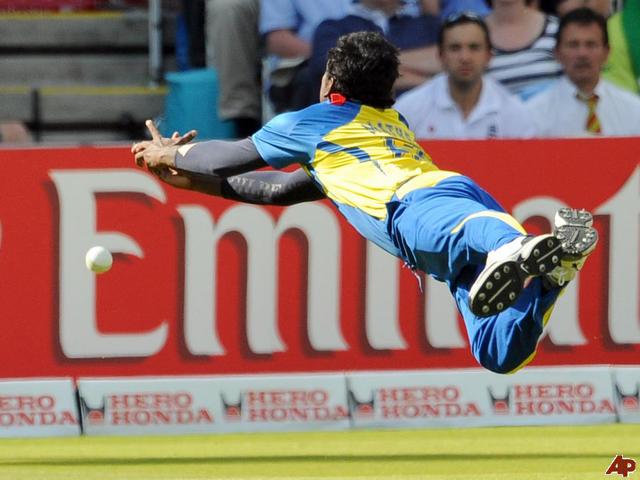
Picture Lesson: One dive of excellence can be a giant leap for your organization!
A few years ago, Greg Chappell became the coach of the Indian team and the first thing he spoke of was about the need to pursue excellence. Even today, people still remember Chappell’s words. Alas, those words are among the very few things from Chappell’s times that resonate with the term excellence. The more he harped in the media about pursuing excellence, the more the team sank into a bottomless abyss.
After the horrid time with Chappell, the team changed its coach and brought in Gary Kirsten. Kirsten instilled all that Chappell wanted to, and even more, but in a manner that focused on the action rather than words alone. The mantra was simple - play well as a team. He set himself two goals - win the Test championship and win the world cup. He achieved both. And he gave credit to his players, instead of his predecessor who was more in the news for his ideas than his performances as a coach.
In any organization, the pursuit of success must begin with getting the regular things right. That would mean getting the simpler, everyday, operational things in order - make sure the right people are present to attain the goals set, the right tools are available and the right approach is shared by all. If the manager believes in excellence but does not act upon it and yet constantly harps on long term goals while ignoring smaller, short term, achievable targets, it can become meaningless since excellence as a term would then sound hollow when the immediate targets are not met.
Treat Process as a Means and not an End
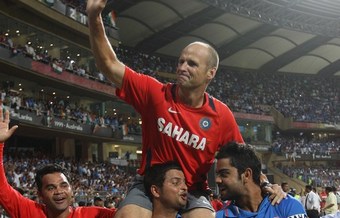
Picture Lesson: Gary, the First!
The story of Greg Chappell and Gary Kirsten leads us to evolve this lesson. The world cup proved how much the ends to a process are important as much as the means, or perhaps even more than it. Greg Chappell was more involved in grappling with the process rather than implementing the ideas. Gary Kirsten used process more as a means to an end. He used processes to identify gaps in the system and then plug them. He brought Paddy Upton - a mental conditioning coach and later in the world cup brought an adventurer - Horne - who had survived life threatening expeditions through sheer willpower, determination and self belief. He used the processes to exploit the local factors rather than fight them. Chappell tried to turn the system upside down instead of creating a process that helps take the best from the system.
Sometimes a manager or a leader can be in love with his own process so much that he forgets about the goals to be achieved. The beauty and preciseness of the process can make him a prisoner of his ideas. He must understand there is an organizational culture inside which he and his colleagues operate. This culture can either help him achieve his goals or can be a hindrance, depending upon the way he chooses to work around or against the system. Many a times, a manager spends a lot of time trying to impose his processes on a system which is not ready for it. The processes are then not understood and the purpose of having these processes is then lost, and ultimately as the goals become difficult to achieve, and frustration and desolation set in. It then affects everyone. Its isn’t far to seek the reasons for Chappell’s failure as a coach. They were more to do with an inflexible mind that treats processes as independent and isolated from of the people who are involved in it.
Nurture your colleagues
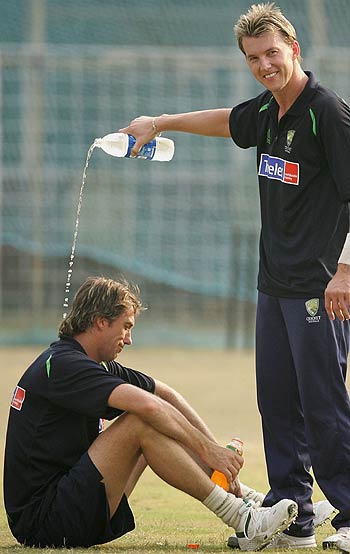
Picture Lesson: One day he will grow up to be a Pigeon!
Having put together a team of dedicated individuals, it is important to nurture the individuals in the team. Some individuals may not produce results instantly but need to be helped and nurtured. Stuart Broad of England was hit for 6 sixes in an over by Yuvraj Singh a few years ago in a world cup T20 match. The same bowler has been persisted with by his captain Strauss and coach Andy Flower over time and today he happens to be the team’s premier strike bowler.
Graeme Swann is another player who has been nurtured well by England and has now emerged as a world class off spinner. To an extent, Gary Kirsten nurtured Yuvraj Singh’s talent too, when he was going through a lean phase, gave him the confidence and allowed him to fully flower when the team needed him.
In the workplace, there would be people who wouldn’t be as expressive either with their work or with their problems. It is for the manager to seek out the inner workings of the mind and work around people who he feels need to be helped and nurtured. After all, there is no greater and more valuable contribution to a team than that from a member who has realized his potential and his confidence is on a high.
To nurture a team member to his or her potential, it is important that a leader understands the capability of the individual and also the targets that have been set for him/her. It is always possible to effect improvements in a person’s capacity - and that’s the contribution of a good manager. It is no rocket science but requires careful observation and identification of the latent talent in a team member. Channelizing a team member’s strengths helps in nurturing him through the process.
Tactical Acumen

Picture Lesson: Tactical positioning is key to gaining advantage!
Apart from the fact that MS Dhoni showed great leadership skills by taking up the challenge of batting up the order in the final, despite a poor form, there was also a tactical shrewdness that he exhibited.
He knew that getting Yuvraj to go out and bat when Gautam Gambhir was at the other end would mean three things. First, it would put two southpaws together which meant that the Lankans would have found it easier to plan and didnt have to change their bowling line. Also, Yuvraj wouldn’t have found it easy to play the Lankan offspinners as the ball would’ve gone away from him. Thirdly, he surprised Sri Lanka and made them rethink since they would have originally planned for Yuvraj at No 4.
As a manager of a team, there has to be an instinct for sensing opportunities and then exploiting them with the resources at disposal. In a corporate set-up, there may be opportunities for a firm that a leader has to identify at an early stage. As an astute skipper, he needs to optimally use his resources to make use of the situation.
For that to happen, a leader must know what strengths his team has or the skill-sets that can be called upon at an opportune time. He must know who the right man for a job is and employ those skills well. He must also know about competitors and the market, whether these would be key factors in the scenario. In the case of MSD, he knew the abilities of Yuvraj as well as the capabilty and resources of the opposing team.
A strong leadership culture shapes outcomes
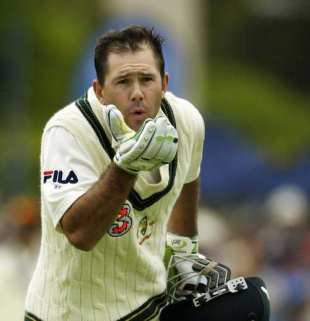
Picture Lesson: Mates! Aise phoonk maro, and your opponents will disappear!
Being proactive helps in shaping outcomes instead of waiting for results to happen. Kumar Sangakarra, otherwise an astute captain waited for something to happen in the final instead of bringing on his best bowler Lasith Malinga after the Indians were beginning to sail smoothly. Malinga did not even come back to bowl when the ball would have reverse swung after thirty odd overs. On the other hand, Shahid Afridi of Pakistan made things happen and that’s why his underrated team did so well.
At work, a leader needs to be proactive and shape outcomes. For instance, if there is a business decision to be taken which can be decisive for the organization, he needs to take a call whether to take it or not. However, he cannot ignore thinking about it.
At places, a manager may need to take a proactive decision - for instance of hiring someone who can bring in the results even though the hiring may seem a little ahead of time. The manager would do well to give it a good thought. Thinking proactively helps take a decision that is decisive. Taking a decision not to do something is also a proactive decision so long as there has been a logical thought process behind it. It’s a proven fact that dynamic leaders produce the most leader generated outcomes.
Be upfront and candid
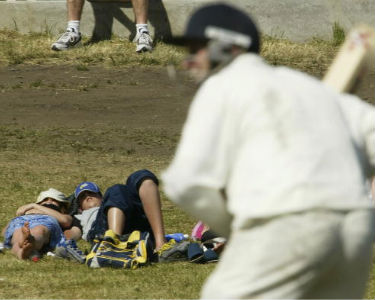
Picture Lesson: Frankly, I don’t think I’ll Misbah much if I catch a nap!
MS Dhoni was always straightforward in his comments, without hurting anyone. He even took digs at himself saying that people would have got after him if his innings had not come off the way it did in the final. He didn’t spare Gautam Gambhir either and said that Gauti was himself responsible for missing out on his century. It was all done in a manner that sent the message home and did not hurt anyone.
In an office environment, it is also better for a manager to be upfront with his colleagues so that they know what is expected of them. It is not advised to surprise colleagues with a sudden bad report after they have been given accolades all the time. It is better to let people know what their weaknesses have been and where the areas of improvement are going to come from. However being brutally candid, negative and rubbishing a colleague’s efforts may be a disaster, for that will neither bring in a positive change in efforts nor can it be motivating for the colleague. A constructive feedback and involving oneself in turning around a colleagues’ performance is the hallmark of a successful, hands-on manager.
Make your team look better than the good work they have done
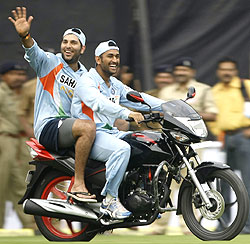
Picture Lesson: Keep smiling! Tu pillion par hi zyada acchha lagta hai!
After the world cup was won, everyone gathered around the trophy but Dhoni remained the facilitator, staying behind and not trying to be in the pictures by planting himself in the center of the team. He urged people to take Sachin Tendulkar on their shoulders, thanked the team members and the coach. The coach Gary Kirsten never overplayed his contribution even after the victory. He maintained that it was because of fantastic team efforts they had won the world cup.
In an organization, if a leader were to grab the headlines and centre stage all the time and not give his team enough recognition, there might be a lack of satisfaction brewing inside. It is imperative that a manager values the contributions of people and acknowledges their efforts. It is always heartwarming for a junior colleague to know that his performances have been acknowledged by his manager. That makes him look good and the theory of self fulfilling prophecy applies - this time for the better!!
The varied capabilities of people in an office have to complement each other, just as it is important for a team on the cricket field to combine well to succeed. Therefore it is important to identify individuals who can be a part of a team early on. Teamwork is a culture that reflects the vision of a leader who encourages it. The ability to inculcate a high rate of teamwork in individuals is a measure of a leader’s capacity to drive players towards collective organizational goals.
, |
| Total 25 vote(s). |  | |
|
|
|
|
|
 | Messages/Opinions |
|
|
| | No messages yet! Be the first one to post a message here. |
|
Click Here to login and post message
|
| Indian Alumni and Students from the following Indian and Global Institutes are invited to be members of 6bridges.com: |
| |
| India |
| Business & Accounting Institutes : FMS, ICAI, IIFT, IIM(A), IIM(B), IIM(C), IIM(I), IIM(K), IIM(L), IRMA(Anand), ISB, JBIMS, MDI(Gurgaon), NITIE, NMIMS, SJMSOM(IIT Bombay), SPJIMR, TISS, XIMB, XLRI |
| Technology Institutes : BIT(Mesra), BITS(Pilani), COE-Guindy(Anna Univ.), DCE, IISc, IIT(B), IIT(M), IIT(D), IIT(G), IIT(K), IIT(Kgp),IIT(Roorkee), ISI(Kolkatta), ISM (Dhanbad), IT-BHU, Jadavpur Univ., National Institutes of Technology(RECs), PSG(Coimbatore), RVCE(Bangalore), VJTI |
| |
| Global |
| Business, Technology & Accounting Universities/Institutes : AGSM(Sydney), AIM(Manila), Caltech, Carnegie Mellon, Columbia, Cornell, Dartmouth, Duke, Georgia Tech, Harvard, ICAEW(UK), IMD(Switzerland), INSEAD, Judge(Cambridge), London Business School, Manchester, Melbourne Business School, Michigan, MIT, Northwestern, NYU, Princeton, Purdue, Queen's(Canada), Said(Oxford), Stanford, U.Chicago, U.Penn, UC Berkeley, UCLA, Univ. of Illinois-Urbana, Univ. of Southern California, Univ. of Virginia, Warwick, Yale |
|
|




























